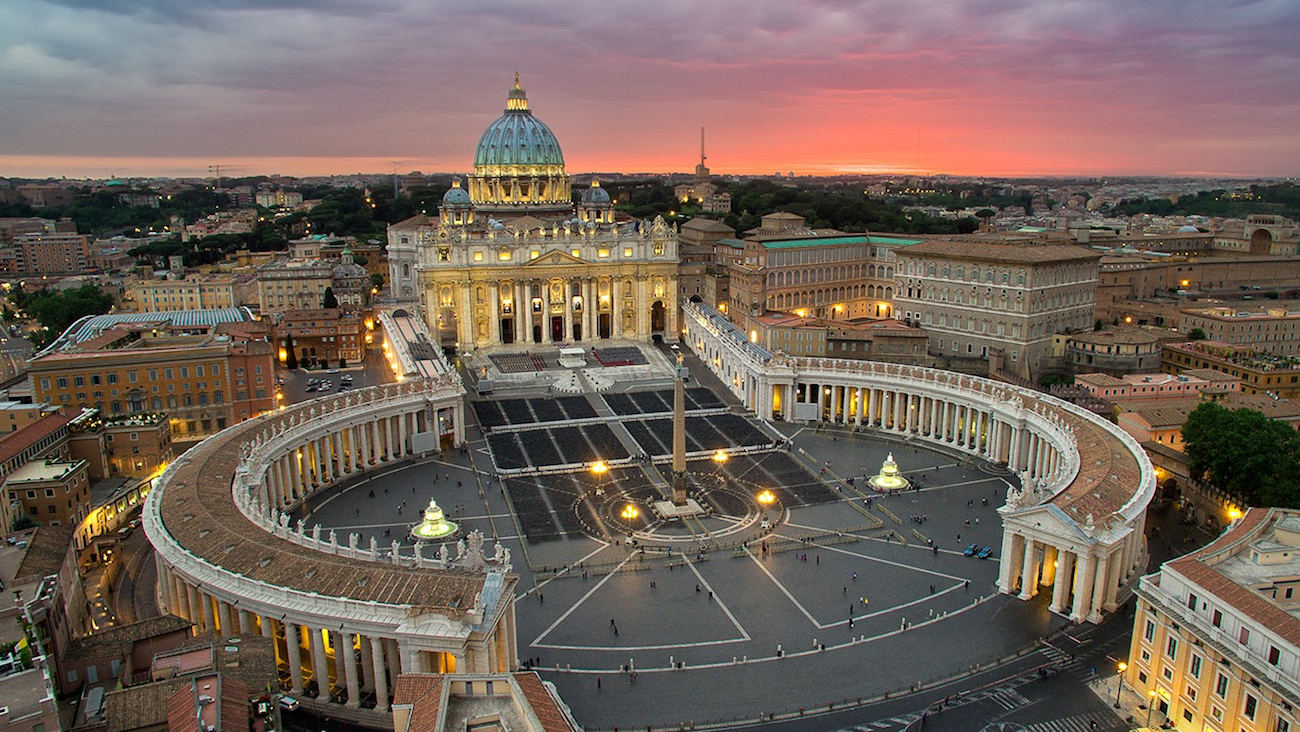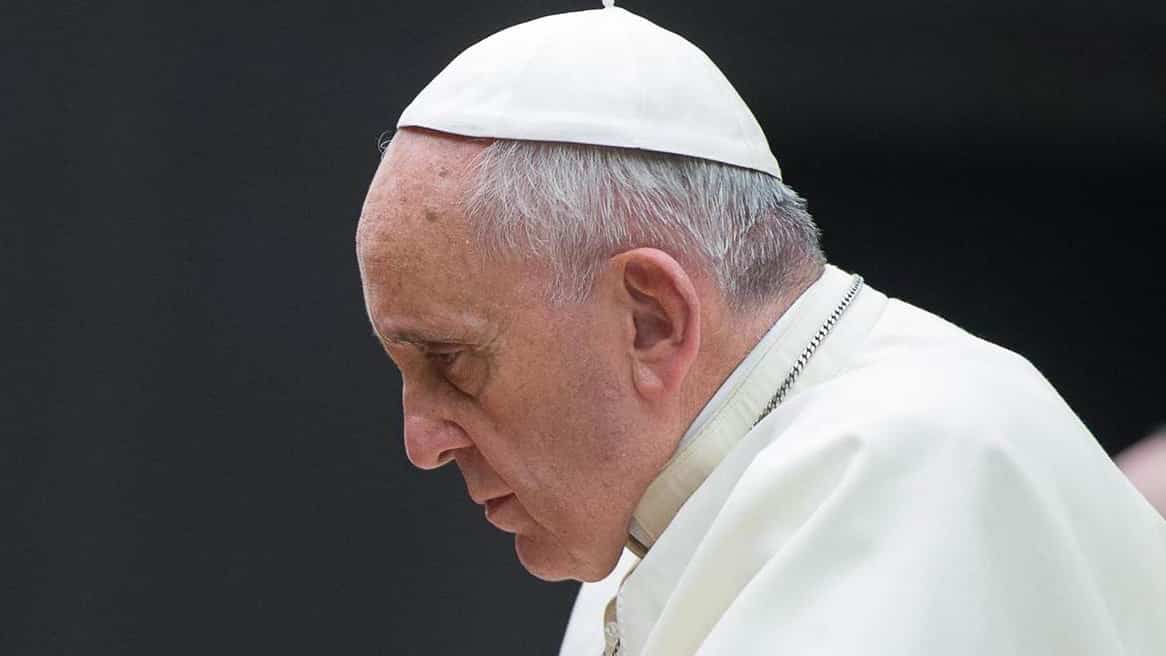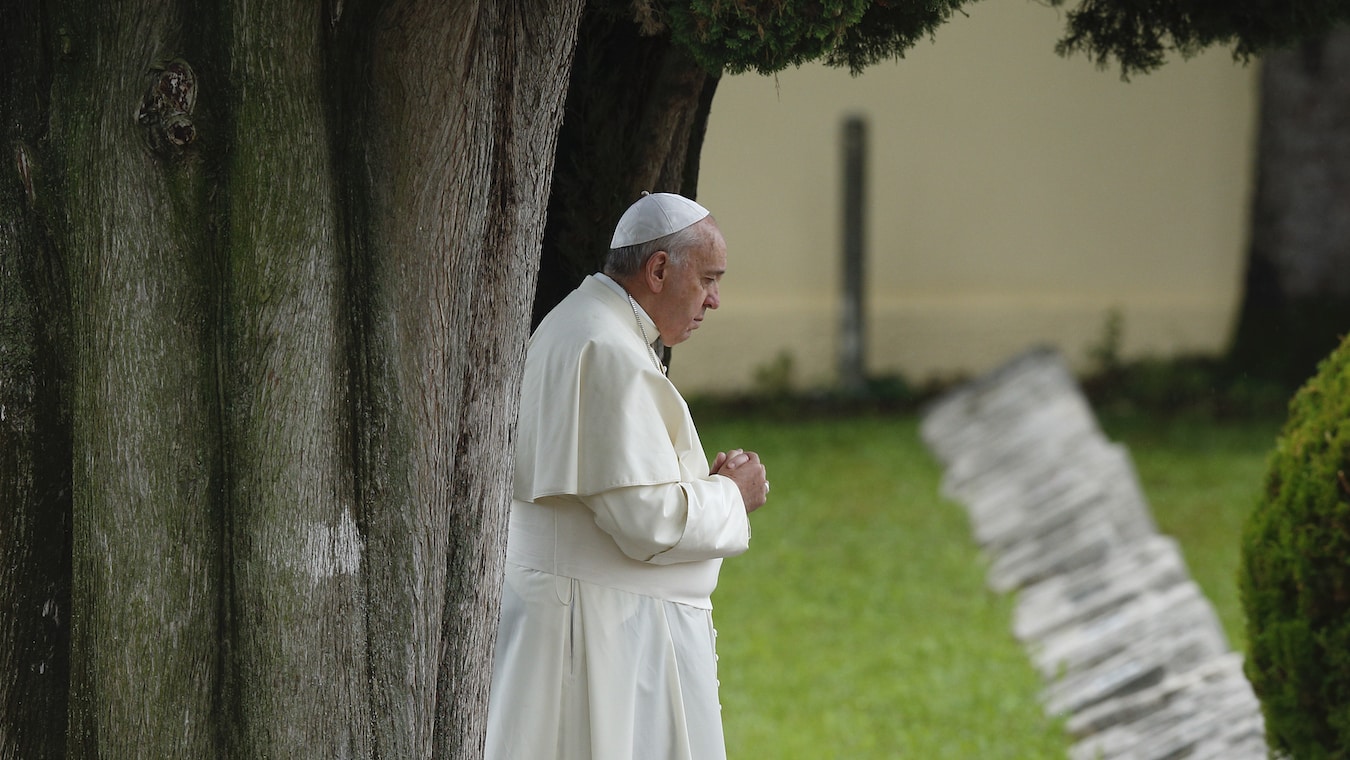Pope Francis has issued a challenge to traditional Catholics by welcoming prominent population-control advocates such as Paul Ehrlich to speak before the Pontifical Academy of Sciences earlier this year. This invitation was extended in the context of Pope Francis’s call for “sustainable development” and warnings against global warming and alleged corporate destruction of the environment. In extending this invitation to Ehrlich and other population-control advocates, this pope’s Vatican gives further evidence of embracing left-wing environmental, economic and population-control positions.
Calls for Sustainable Development
The Vatican’s invitation to Paul Ehrlich came on the heels of a series of pronouncements by Pope Francis on the environment, sustainable growth and criticism of global capitalism. In the early summer of 2015, Pope Francis issued an encyclical, Laudato si, which warned of impending global disaster because of climate change. The encyclical distinguished between human needs and appetites.
Human needs, the encyclical declared, are small and non-negotiable, while appetites are potentially unlimited and harmful. Because human appetite is unlimited, Pope Francis counseled, consumerism must be constrained and conventional fuels must be replaced by renewable energy. The tone of the encyclical was dire and, at times, graphic. For example, Pope Francis declared that “The Earth, our home, is beginning to look like an immense pile of filth.”
In preparing for the encyclical, the Pontifical Academy of Sciences in April 2015 had sponsored a meeting of scientists, theologians and economists to discuss the relationship between poverty, economic development and climate change. This summit left no room for voices who could point out that economic development over the last century has lifted millions of people out of poverty, or for any discussion of the misallocation and corrupt use of funds sent to developing countries. Nor did the conference allow much room for those having different views as to the causes of climate change. United Nations Secretary-General Ban Ki-moon, who offered the keynote address, set the tone for the summit. He urged world leaders to ratify the Paris climate change accord that had been drafted in December 2014.
Francis the Anti-Capitalist
Pope Francis’ call for sustainable growth and warnings about climate change should be seen against the backdrop of his propensity to demonize capitalism. Inequality of wealth, he contends, is caused by free markets and the idolatry of money by greedy capitalists. While Pope Francis attempts to qualify his critique of capitalism by using modifiers such as “unbridled” capitalism, his language describing free markets as “the dung of the devil” lacks qualification for average listeners. He calls for income redistribution through government action, greater government regulation of markets, and higher minimum wages for all workers.
In his 2013 letter Evangelii Gaudium, Francis wrote that the economy “can no longer turn to remedies that are a new poison, such as attempting to increase profits by reducing the work force and thereby adding to the ranks of the excluded.” In 2015 he proclaimed that the poor have “sacred rights” to labor, lodging and land. Just to ensure his views were not misunderstood, he referred to global austerity measures by the European Union and the World Bank as a form of “new colonialism.”
More recently, Pope Francis unhelpfully weighed in on an Italian labor issue. The “Sky Italia” TV platform announced on March 14 that it would be downsizing and moving some 300 employees and their families from Rome to Milan, after selling the firm’s digital properties to Quantum Native Solutions. At his general audience the next morning Francis offered a special greeting to the employees of Sky Italia, adding, “Those who engage in economic maneuvering to make murky deals, closing factories and businesses and laying off workers in the process, commit a very grave sin.”
Layoffs Are a ‘Grave Sin’?
Does Francis really mean that keeping a business alive in a competitive market, even if it means cutting labor costs, is a grave sin? Does he not realize that running a company into bankruptcy or closure — which would destroy all its employees’ jobs as well as lose the investors’ money — would be a worse outcome?
Pope Francis places his economic views within the tradition of Catholic social justice. He interprets the commandment “Thou shalt not kill” as an injunction against economic injustice. He argues that income inequality and economic exclusion constitute another way of killing people. Although he is a critic of “liberation theology,” underlying his views about income inequality, financial markets and social justice is a confusion between the meaning of Catholic social justice and socialism, indeed Marxism. Pope Francis once declared that “Marxist ideology is wrong,” only to add, “I have met many Marxists in my life who are good people . . . . There is nothing in the [Marxist] exhortation that cannot be found in the social doctrine of the church.”
This facile comparison between Catholic social doctrine and Marxism is astonishing. Marxists claim to be concerned about the poor, express anguish over social inequality and abhor consumerism, but the Marxist profession of faith calls for the abolition of marriage, all private property and religion (a false ideology), and the dictatorship of the proletariat. Christ’s revolutionary message of redemption for all God’s children is not Marxism under any guise.
A Benign View of the State
What Pope Francis and Marxists share, it seems, is a benign view of the state. Pope Francis calls for more government intervention in the economy to regulate the environment and to redistribute income. His apparent sanguine view of the one-party state in communist China and Cuba can only be seen as naïve. His consideration of a proposal to allow the Chinese state to appoint Catholic bishops harkens back to the worst aspects of the pre-Reformation church, which allowed European monarchs to appoint corrupt bishops in their provinces. Does Pope Francis believe that the Chinese state will appoint bishops who are not compliant with one-party rule in China? Is it even conceivable that Chinese government authorities will appoint bishops who dissent from wholesale destruction of churches, suppression of the free press, and state repression of worker rights and religious liberty?
Pope Francis appears to welcome with open arms “dialogue” with the left and those who hold progressive views, while closing the door to theological traditionalists, political conservatives and proponents of free markets. He ignores that advanced industrial and post-industrial countries have achieved and pursue environmental measures to “save the planet.” He apparently fails to see centralized governmental power as a threat to individual political liberty and genuine economic freedom.
Who is Paul Ehrlich?
This brings us to the Vatican’s invitation to Paul Ehrlich and other population-control activists to speak before the Pontifical Academy of Sciences. Ehrlich, a biologist at Stanford University, is best known for his best-selling book, The Population Bomb, published in 1968. The book warned of a global overpopulation crisis that portended mass starvation, riots, economic depression and destruction of the environment. His neo-Malthusian argument raised the alarm against a population explosion in developed and developing countries.
His solution was “radical surgery” to excise the “cancer” of runaway human population growth. Without strong coercive measures for population control, he predicted, hundreds of millions would starve to death. He argued that it was already too late to avoid famines that would kill millions. Ehrlich’s apocalyptic predictions found support within the burgeoning environmental movement in the 1970s. Environmentalists and organizations such as the Sierra Club and Zero Population Growth began calling for coercive measures to control world and American population growth. Environmentalists proposed putting contraceptive chemicals in water supplies; penalties for families having too many children; and federally financed abortions.
With the support of the United Nations, governmental and foundation funds, population-control programs were launched in developing countries. These programs caused untold suffering for those caught in the middle, especially women and children. In India, the Indira Gandhi government constructed sterilization camps for men and women. Armed soldiers were sent to villages throughout India forcing men and women to be sterilized. In Southeast Asia, women were encouraged to undergo sterilization or accept contraceptive implants, often with offers of food, sometimes as little as a bag of rice. Many of these women suffered from pelvic inflammation diseases caused by implants inserted by foreign aid workers who abandoned the women without follow-up care.
Ehrlich won widespread praise for his book, appearing on hundreds of television and radio programs. The book went through 23 editions. There were only a few dissenters. One was the University of Chicago-trained economist, Julian Simon, who publicly disputed Ehrlich’s grim predictions by arguing that human ingenuity and technology would increase food production and address environmental issues. In the pages of Social Science Quarterly in 1980, Simon challenged Ehrlich to a $1,000 bet testing their competing visions of the future. The bet was simple: Take five industrial metals over a ten-year period to see if prices went up or down.
If Ehrlich was correct about population growth exhausting world supplies, the prices of metals for industrial use should rise astronomically. Ehrlich accepted the bet, but Simon proved correct. Prices of the agreed five industrial metals went down. Ehrlich never paid up on the bet — but not for lack of money. He had become a millionaire off the sales of his books and speaking fees.
In the international arena, environmentalists joined feminists in calling for controlling population growth. United Nations Conferences on Women endorsed population-control measures and programs. Opposition to environmentalist and feminist delegations came from Vatican delegates, who often joined forces with delegations from Islamic countries. This perhaps is the fullest irony of the Vatican’s invitation for Ehrlich and population-control advocates to participate in a closed-door workshop on “How to Save the Natural World on Which We Depend.” The Vatican, one of the strongest opponents of population control in the last half century or more, was now willing to listen, if not accept, the advice of Ehrlich and other population-control advocates.
Saving the Natural World
The February 2017 Vatican workshop on “How to Save the Natural World” brought international experts together to propose political, social and economic policies to make development “sustainable” and prevent further biological extinction. The program sought to prevent the extinction of thousands of different species on the planet. Pre-conference material warned that allowing the extinction of life-supporting species “will probably be the sin for which our descendants will be least likely to forgive us.”
Ehrlich was one of the main participants at the conference. He was joined at the workshop by other population-control advocates including John Bongaarts, vice president of the Population Council, a Rockefeller-funded organization, and Mathis Wackernagel, president of Global Footprint Network. These invitations were not surprising given that one of the principal conference organizers was Sir Partha Dasgupta, an economist at Cambridge University. He was known for predicting that climate change in Africa and resulting famine would lead to “100 million Africans trying to swim across the Mediterranean” in search of food.
Ehrlich has not mellowed with age, either; in fact, he has become even more radical. In his most recent book, Hope on Earth: A Conversation (2014), he condemned “God-fearing people” for “trying to maintain their rigid positions, especially trying to control the lives of women.” In particular, he called opposition to “controlling reproduction” as “unethical as any major affront to the environment or terrorist act.” In effect, he branded Catholics, evangelical Protestants and Mormons who opposed abortion or federally funded contraception for women as “terrorists” and destroyers of the environment.
Ehrlich has never backed away from his longtime claim that the world stands on the verge of environmental, social and political catastrophe because of rampant population growth, even though nearly every demographer in the world knows that fertility levels have fallen everywhere and remain deeply depressed in every industrially advanced country, a trend that is also reaching Latin America and much of the Middle East and Africa. Furthermore, Ehrlich remains a strong proponent of abortion as an instrument for population control, even abortion for sex selection.
The first week’s meeting of the academy barred all reporters from covering the event. Critics, such as Riccardo Cascioli, president of the European Center for the Study of Population, Environment and Development, opined that the meetings were closed because the Vatican was trying to keep the press from reporting its shift in favor of population control. Cascioli, who attended the conference, told the press, “This meeting is not an isolated incident. It is the outcome of a process that has been going on for a few years, one that is leading the Holy See to become an instrument of the birth-control movement.” He revealed that at the closed meetings many speakers called for the “physical elimination of the poor” in order to “eliminate poverty.”
At the conference, environmental radical Peter Raven asserted, “We need at some point to have a limited number of people, which is why Pope Francis and his three most recent predecessors have always argued that you should not have more children than you can bring up properly.” Raven went on to declare that “we need a more limited number of people in the world” because “the problem is one of inequality.” He maintained that controlling population is necessary to address “social injustice worldwide.” Raven used the language of social justice, love and compassion, and sustainability — all fine-sounding words — to support controlling population.
Wanting 6 Billion Fewer People
But at a news conference days earlier, Ehrlich revealed his real agenda when he advocated in an interview with The Guardian for reducing the world’s population by 6 billion people to bring it down to 1 billion people. He stated that he was “thrilled” with the direction Francis is taking the Church. If Ehrlich and other population controllers, progressives and Catholic liberals are thrilled with the direction Francis is taking the Vatican, others within the Church are dismayed by apparent Church support for radical population control, especially in an era of below-replacement birth rates in industrialized countries.
The Church faces difficult times in this age of secularism. Throughout Africa and Asia, people have turned to the Catholic Church to give new meaning to their lives. These people have discovered hope in Christ’s message of the dignity of every human life. In the United States and Europe, traditional Catholics know that capitulation to secularism has led to steep declines in membership of mainstream Protestant churches. They understand that Christianity has played a central role in the development of capitalism, which has lifted millions of people out of poverty throughout the world. Calling for fewer people in the world and denouncing capitalism are not the answers to today’s problems, no matter the good intentions of a pontiff trying to be in touch with the times.









How about if Paul Ehrlich and Peter Craven are the first to go from this planet that they want to rid of 6 billion people!
I am appalled ……
Its time for Pope Control.
Remove the occupant! Replace with a Real Catholic.